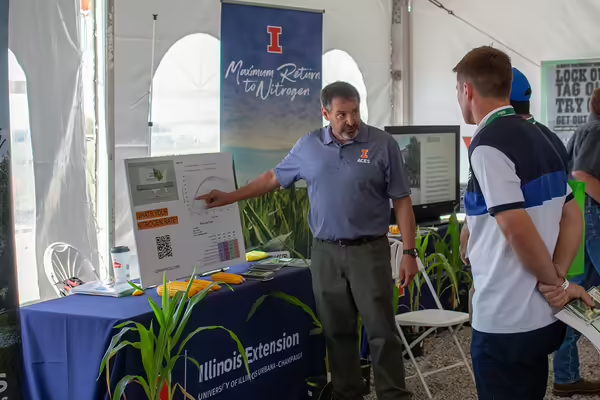
PEORIA, Ill. — Meet with agriculture specialists from University of Illinois Extensionand learn about the latest research during the Greater Peoria Farm Show, Dec. 3-5.
Show attendees can visit the Illinois Extension booth to discuss their questions and find resources on farm leasing, grain marketing, farm estate planning, soil fertility, farm drainage, digital technology, variety selection, and fertility programs.
“Agriculture continues to be a quickly evolving industry with new technologies emerging almost daily,” says Illinois Extension Commercial Agriculture Educator Tara Heath. “Now more than ever, in this challenging economic environment with rising input costs and tighter margins, it’s important for local producers to have research-based information so they can decide which new technologies make the most sense for their unique farms.”
New this year, Illinois Extension educators and University of Illinois faculty will be sharing informative presentations throughout each day of the Greater Peoria Farm Show. Presentations will cover a range of relevant topics, including managing financial risk, nitrogen use efficiency, tips for farm succession, and much more. See the full schedule of Illinois Extension presentations.
“Our participation in The Greater Peoria Farm Show gives us an opportunity to showcase what we can offer to local farmers and owners on the commercial farm side and to local homeowners on the horticulture side,” says Illinois Extension Farm Business Management and Marketing Educator Kevin Brooks. “In the showcase, attendees can view new technologies as well as attend seminars to learn how they can put research-based knowledge to work at home, at work, and in their communities.”
Supporting the agricultural community is a key priority area for Illinois Extension, and producers in west-central Illinois are benefiting from the expertise of four new locally based commercial agriculture educators who have joined county Extension offices in the past year.
“Extension has a long history of supporting agriculture at the local level,” says Janice McCoy, Illinois Extension assistant director for Region 2, which covers the west-central portion of the state. “In the past year, we have increased our staffing capacity to respond to issues, concerns, and the educational needs of producers.
“Events like the Greater Peoria Farm Show give us an opportunity to highlight all that we have to offer, share the latest research-based information, and hear from producers about their needs,” says McCoy.
Along with the educational presentations, Illinois Extension educators and specialists will be available for media interviews at their booth during show hours on Tuesday and Wednesday from 9 a.m. to 4 p.m. and Thursday from 9 a.m. to 3 p.m.
The Greater Peoria Farm Show will be held at the Peoria Civic Center located at 201 SW Jefferson Avenue. There is no cost to attend, and parking in the Civic Center lots is free.
For more on Illinois Extension’s impact on agriculture and to find a local office, visit extension.illinois.edu.
SOURCE: Kevin Brooks, farm business management and marketing educator, Illinois Extension
Photo Caption: Extension Commercial Agriculture Educator Russ Higgins discusses soil nitrogen rates. Photo by Emily Steele, University of Illinois Extension. The photo in this article is available to download for media use.
University of Illinois Extension develops educational programs, extends knowledge, and builds partnerships to support people, communities, and their environments as part of the state's land-grant institution. Extension serves as the leading public outreach effort for University of Illinois Urbana-Champaign and the College of Agricultural, Consumer and Environmental Sciences in all 102 Illinois counties through a network of 27 multi-county units and over 700 staff statewide. Extension’s mission is responsive to eight strategic priorities — community, economy, environment, food and agriculture, health, partnerships, technology and discovery, and workforce excellence — that are served through six program areas — 4-H youth development, agriculture and agribusiness, community and economic development, family and consumer science, integrated health disparities, and natural resources, environment, and energy.